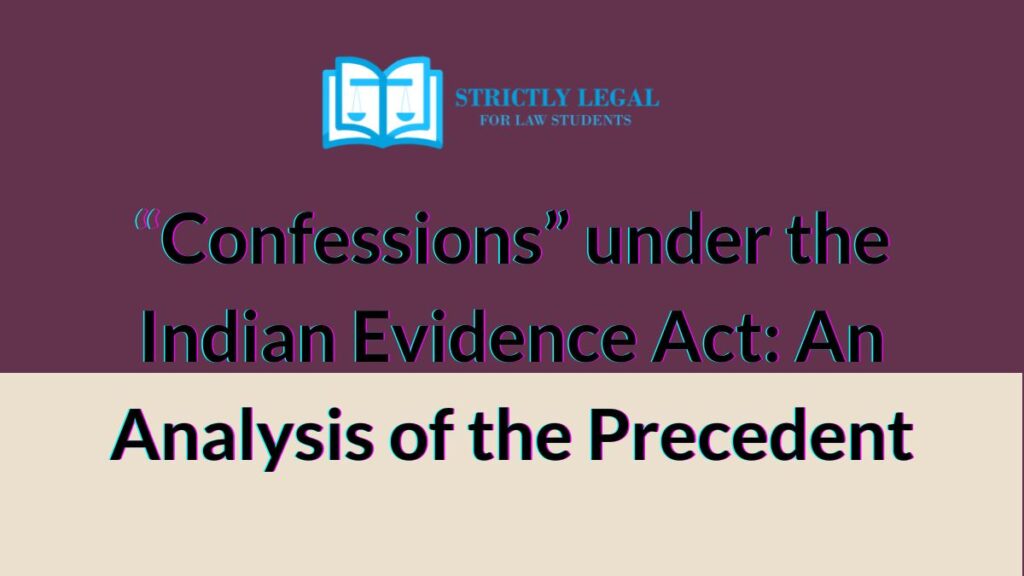The term “Confession” has nowhere been defined or expressed under the Indian Evidence Act [herein after referred to as the Act] but the conjecture explained under the definition of “admission” in Section 17 of the Act is also applicable to confessions in the same manner. Nonetheless, section 17 expressly states
“that any statement may it be oral or written which is put forward for the consideration of any conclusion to the fact in issue or the relevant acts.”
Indian Evidence Act [Act no. 1 of 1872]
This article will take the help of two precedents to establish a stern and crisp understanding of “Confessions” under the Act.
Table of Contents
Understanding the term “Confession”
After reading the introduction, it must be cleared that the preliminary meaning of confession is something made by a person who is charged with or accused of criminal offences and such statements given out by him shall be suggesting a conclusion as to any facts in issue or as to relevant facts.
Understanding the term “Admission’
Admission plays a vital role in judicial proceedings on the condition that either of the parties to the suit in the legal proceeding proves that the other party has admitted to the facts in issue or the facts that are relevant to the case, then it becomes way more smooth and easy for the Court of Law to jury the justice effectively with comparatively less time and need not take much of evidence and has not to include the legal proceedings because the issues of the case would have already been settled by either side of the parties in the passage of admission.
The word “Admission” expressed in the Act is as follows:
“When any person voluntarily acknowledges the existence of any facts in issue or facts”
Indian Evidence Act [Act no. 1 of 1872]
Types of Confessions
The types of confessions might be of several types in the cases, but, largely this article focuses on two types of confessions ie., Judicial confessions and Extra Judicial confessions.
Formal Confession
This category of confession is also known as Judicial Confession which refers to only those statements that are made before a magistrate or an officer or in the court of law in the course of a criminal proceeding. Article 20(3) of the Constitution of India explains a judicial confession as “a plea of guilty”, otherwise any person confessing the confession will have no evidentiary value and such action cannot be concluded as he is “guilty” of any offence charged against him.
Informal Confession
This category of confession is also known as Extrajudicial Confession, which refers to any statements made at any place other than the place where there is an absence of of magistrate or at any place other than the court. However, it is to be taken care by the Court of Law that, like judicial confession, extrajudicial confession should also be consistent with Article 20(3) of the Constitution of India which says “No one should be compelled to give evidence against himself”, which generally means, confession made by the accused should be willfully done by him and must be true, then only he can be charged for any criminal offence.
When does a confession becomes irrelevant?
A confession becomes irrelevant when it is made by the accused of some offence if such a confession is acquired out of inducement, threat or promise made by such personnel who are in a dominant position I.e., a police officer, magistrate, court etc., and that inducement, threat or promise should be with regards to the charge of any offence and all such inducements, threat or promise should give the benefit of temporal nature.
Precedents defining Confession:
In the case of Pakala Narayan Swami v. King Emperor [ (1939) 41 BOMLR 428], the privy council concluded with an opinion that the statement that the accused gave was partially a confession and partially a description of his innocence. By the benefit of the doubt, the privy council stowed away the conviction of the accused by observing the following:
- The word ‘confession” can be manufactured from the statement of the accused proposing the conjecture that he had committed the alleged crime.
- A confession either acknowledge in terms of the offence or at any rate considerably acknowledges all the facts that comprise the offence.
- An admission of soberly denouncing facts even if a conclusive denouncing fact cannot be taken as a confession.
- A statement that contains self-explanatory matter cannot lead to a confession. It must be either taken or rejected.
- The statement of the deceased to his wife was considered as a dying declaration and hence admissible u/s 32(1) of the Act.
In the case of Md. Ajmer Md. Amir Kasab alias Abu v. the State of Maharashtra, [(2012) 9 SCC 1], at first the Trial Court passed a verdict of the death penalty to the accused Ajmal Kasab, after which the accused challenged the judgement at the High Court where his plea was turned down by the High Court and endorsed the death penalty. After that, the accused again filed a plea at the Apex Court with the hope to cancel his death penalty but the Honorable Apex Court endorsed the previous judgments. However, under Article 21 of the Constitution of India, every person has the right to free legal aid and a fair trial. The same was provided to the accused. He gave his confession of his free will and u/s 164 of the Code of Criminal Procedure, the magistrate had recorded his confessions. The accused first wrote a letter to the authorities of Pakistan to provide him with a Pakistani lawyer, however, Pakistan refrained from accepting him as a citizen of their country. Hence, was later awarded the death penalty.
Difference between Confession and Admission
| CONFESSION | ADMISSION |
| Something made by the person who is charged with criminal offences and such statement may conjecture any reasoning or conclusion that he may have committed the crime. | When any person with his own will voluntarily agrees the existence of any facts in issues. |
| Confessions deals with criminal proceedings and there are no statutes in the Evidence Act that defined confession. | Admission generally deals with civil proceedings and it is defined u/s 17 of the Act. |
| If it is purposeful and made out of someone’s will, it may be taken into consideration. | May be considered as estoppel as they are not conclusive as to the facts admitted by the person. |

Law student.
Turning legal insights into engaging narratives.





